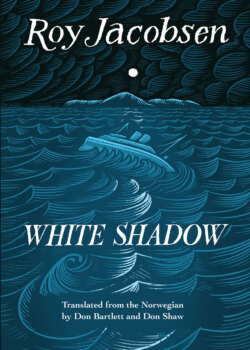Читать книгу White Shadow - Roy Jacobsen - Страница 8
На сайте Литреса книга снята с продажи.
4
ОглавлениеWhen Ingrid had been on Barrøy so long that even the thought of a clock had gone, a seal got entangled in the net furthest away.
She pulled the seal ashore and saw that it was dead. It was small, maybe a pup. She left it there for the eagles. But it had damaged large sections of the tackle, so she dragged the nets homewards to repair them, then she spotted another seal, which was lying in the snow, barely moving its flippers. She went closer. It looked at her through one black and one white eye. They’d had seals on the island before, but they were shy and took to the water when people approached. This one seemed limp and sickly and was no bigger than the dead seal.
Ingrid put down the nets, dug out a rock with her hands and killed it. Two eagles took off from Moltholmen and swooped down on her. She thrust an arm into the air, they recoiled, thrashing their massive wings, before landing back on the islet, where they sat cackling, eyeing her. One of them had an almost white head, the other was browner and slightly smaller.
Ingrid considered whether to skin the seal, but didn’t know how to, and her father had said you had to be careful with seal meat, there might be trichina in it.
She was about to walk on, but as she lifted the nets she caught sight of some brown cloth beneath the snow, wadmal, it seemed. She pulled out a tattered shirt, and some wood shavings fell from it. Attached to the shirt with hemp twine was a pair of breeches, missing half a leg, and specked with more wood shavings. She had never seen clothes like these. She carried them to the fish-drying rack where she hung them up like ordinary washing, went to the quay house and stretched the nets between the pegs on the wall, picked out the seaweed and grass, and decided she had enough, so she could let them hang there and dry, then they were easier to repair.
She wondered whether to put out new nets, but decided she could eat salted fish for a few days yet, after which she made her way home in the lightly falling snow. A man was standing over by the rack looking at her, a man with one leg. Behind him the two eagles were tearing at one of the seals. The man seemed to be watching them too, it was difficult to see which way he was staring, this man with no head.
Ingrid went in, cooked some food and ate it, scrubbed the kitchen floor, the porch and the hallway, wiped down the stairs up to the loft, got out some wool and yarn, darned the hole in her jumper, realising that it hadn’t been made by a nail at the trading post but by the splitting knife. In the morning she would do some baking, bread and lefser and potato lefser, a baking day, fill the house with the smells of a true home – and with bone-grindingly hard work.
She fetched a sack of wool from the barn and set about cleaning and carding it. She moved the spinning wheel into the kitchen and devoted the rest of the day to this. The rhythm. There was no longer any condensation on the inside walls. The smell of damp earth had gone. She had stopped lighting the fire in the sitting room. The calendar hanging from a nail in the larder, the cat she would soon be getting, the wall clock she no longer needed, the yarn running between her lanolin-softened fingers, and whenever she glanced through the window the stranger over by the drying rack was looking at her.
She wondered whether she should allow herself to get used to having him there, like a scarecrow, or else tear down the rags and throw them into the sea, bury them, burn them . . .
Before darkness fell she wrapped up, went out and felt them, they hung stiff in the frost, as if nailed there. Two dark patches in the snow, on the beach, where the seals had been. The eagles were nowhere to be seen. But she heard their cries, of other birds too, pulsating clouds of cosmic noise, which followed her into the quay house where she saw that the nets were dry and ready to repair. The cries of the birds followed her back home too, but now it was night and the man on the rack could no longer be seen.
